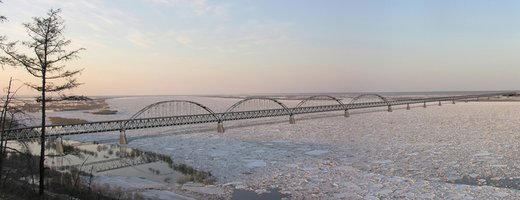14 May 2014
Russia’s success in detaching Crimea from the Ukraine will force it to make a much greater investment in the region’s infrastructure than it had planned, it has emerged.
Alexei Ulyukayev, the economic development minister, announced yesterday that the federal government would spend $4.5bn a year on Crimea’s energy, water and transport networks.
He also confirmed reports published by the Bloomberg business news website on Monday that the government will two large infrastructure projects elsewhere in the country to help pay for work in Crimea.
The two schemes affected are a port on the Taman peninsula, on the Caucasus side of the Kerch Straits, and a bridge across the River Lena in eastern Siberia. That bridge was intended to be the main link with the Yakutsk region on Russia’s Pacific coast.
According to Ulyukayev, cancellation of these projects would free $3.2bn for use in other regions, including Crimea.
Ulyukayev defended the decision to abandon the schemes.
“Port Taman becomes of less importance as we have five deep water ports in Crimea,” he said. “And the bridge across Lena is also under question but for other reasons: the traffic there is low and the project is expensive.”
The tender to build the 2.8km bridge had been awarded to a Russian consortium led by civil engineer SK Most, which had offered a price of $1bn.
The port in Taman was to have handled more than 90 million tons of cargo a year when built, which would have made it Russia’s largest deep water port.

Russia’s $1bn Lena Bridge project will be dropped to pay for infrastructure in Crimea (Transmost)
According to a report in The Moscow Times, the transportation ministry spent years lobbying for the project, which would have seen the port’s equipment modernised and new terminals built to handle grain, metals, coal and containers.
A number of companies had been interested in investing in the port, including coal and metal firms, and logistics operators Global Ports, UCL Ports and OTEKO.
Nadezhda Malysheva, chief editor of port industry site PortNews, told The Moscow Times: “There are still no deep water ports in Russia’s south, and these companies earlier signed agreements in front of President Vladimir Putin on participation in the project, including providing finances. Some of them reserved the required funds in their budgets so it seems very unlikely that this project will be called off.”
The Bloomberg article was based on a letter signed by former economic development minister Andrei Belousov, who is now Russian president Vladimir Putin’s economic aide.
Other analysts have expressed doubt that the Crimean investments are needed.
Alexei Bezborodov, head of Infranews transportation research agency, told The Moscow Times: “They have not calculated anything, have not audited the region and its assets. How do they know how much is needed?”
In March, Dmitry Medvedev, the prime minister of Russia, announced that the Crimea would be a special economic zone, which meant that it would be exempted from taxes and certain regulations.
He said at the time: “Our aim is to make the peninsula as attractive as possible to investors, so that it can generate sufficient income for its own development.”
The Russian Finance Ministry has so far pumped $8.4bn into Crimea since its secession from the Ukraine.
The ministry has said that its aim is that Crimea should be deficit and aid-free by 2017.










